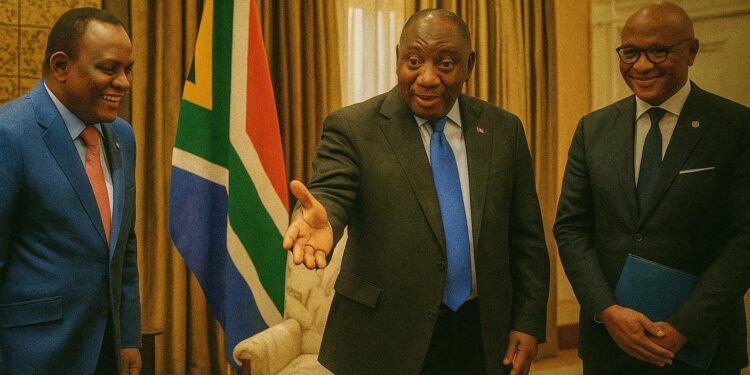Brazzaville and Pretoria: A Convergence of Strategic Continuities
When Foreign Minister Jean-Claude Gakosso arrived in Cape Town on 22 July 2025, his mission rested on a well-trodden foundation of reciprocal political confidence. Since President Denis Sassou Nguesso’s first state visit to post-apartheid South Africa in the late 1990s, the two governments have cultivated a discreet but durable partnership, notably in parliamentary exchanges, hydrocarbons expertise and peace-and-security consultations along the Gulf of Guinea (Congolese MFA, 22 July 2025). Cape Town, the legislative capital imbued with Nelson Mandela’s legacy, therefore offered a symbolically resonant backdrop for the latest high-level engagement. By granting Gakosso an audience, President Cyril Ramaphosa reaffirmed Pretoria’s traditional openness toward Congolese diplomatic overtures and acknowledged Brazzaville’s regional convening clout.
Africa’s Claim to UNESCO Leadership Gains Momentum
Central to the dialogue was the candidature of Édouard Firmin Matoko for the post of Director-General of UNESCO. A veteran Assistant Director-General for Priority Africa and External Relations, Matoko embodies both institutional continuity and continental aspiration, having steered flagship programmes on cultural heritage safeguarding and STEM education for girls over two decades (UNESCO Secretariat data, 2024). African Union summits in Addis Ababa and Malabo have repeatedly underlined the need for greater African representation at the helm of multilateral bodies; yet only a handful of such agencies are currently led by Africans. Securing UNESCO would thus carry a resonance that transcends Brazzaville’s national interests and speaks to a wider, still unfulfilled, African diplomatic agenda.
Cape Town Diplomacy: Nuanced Messages in a Historic Setting
Observers noted the choreography of the Cape Town encounter as intentional. Gakosso’s choice of the parliamentary capital, rather than Pretoria’s executive precinct, subtly invited South African lawmakers and opinion-shapers to invest political capital in the bid. His brief included a sealed message from President Sassou Nguesso, reportedly emphasising educational cooperation and prospective cultural-economy co-ventures that could complement South Africa’s continental soft-power toolkit. According to officials familiar with the meeting, Ramaphosa responded by highlighting South Africa’s own heritage projects, suggesting an alignment of priorities that could energise lobbying within UNESCO’s executive board where Pretoria holds a seat until 2027 (South African Presidency, 23 July 2025).
Regional Balances and the Weight of South African Endorsement
Pretoria’s support is coveted not only for its voting rights but also for its influence among the Southern African Development Community, whose ten UNESCO board seats frequently vote in concert. Diplomatic analysts stress that a simultaneous nod from Angola, already courted by Gakosso in Luanda the previous day, could consolidate a decisive bloc. While South Africa traditionally maintains a cautious stance toward open endorsements, its practice of quiet consensus-building has proven pivotal in past elections, including the 2021 International Telecommunication Union race (Institute for Security Studies, 2022). Hence, Congo’s démarche could tip the balance by signalling that Matoko’s candidacy enjoys cross-regional legitimacy rather than being the preserve of Central Africa alone.
Toward Samarkand: Calculated Optimism and Remaining Variables
The election scheduled for October–November 2025 during UNESCO’s forty-third General Conference in Samarkand will unfold under a complex arithmetic of two-thirds majority and successive secret ballots. Besides Matoko, sources mention confirmed or potential rivals from Eastern Europe and Latin America. Brazzaville’s strategy appears to couple bilateral outreach with a narrative of continuity in UNESCO reforms, positioning its candidate as a bridge between North-South developmental priorities. In private, Congolese diplomats express guarded optimism, noting that gaining South African endorsement early could deter late-entry bids from within the continent. Meanwhile, Paris and Beijing, both keen on an African Director-General who can balance heritage protection with digital transformation, are reportedly monitoring the alignment of African votes before making their own calculations (policy advisers to UNESCO members, July 2025).
Implications for Congo’s International Posture
Whatever the electoral outcome, the current campaign reinforces Brazzaville’s aspiration to shape multilateral debates beyond its traditional mediation roles in Central Africa. By championing a seasoned UNESCO insider, Congo projects an image of constructive multilateralism, congruent with President Sassou Nguesso’s discourse on cultural diplomacy and educational equity. The South African leg of Gakosso’s tour thus falls within a broader pattern of quiet, issue-based activism that allows smaller states to punch above their demographic or economic weight. For Pretoria, aligning with a continental candidate dovetails with its own vision of an Africa that speaks with a single, confident voice in global governance arenas.












































